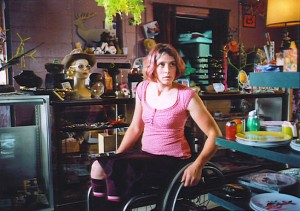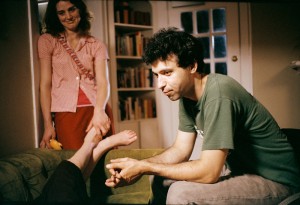Beeswax
 In Danny Boyle’s Trainspotting, his adaptation of Irvine Welsh’s notoriously impenetrable novel, there’s a scene where Johnny Lee Miller’s character, Sick Boy, is heartbroken over the death of his child. All of the other heroin addicts in the room are stunned, staring at the dead baby. Sick Boy screams at Ewan McGregor’s character, Mark Renton, normally the quick witted member of the group, to help out with by breaking up the tension.
In Danny Boyle’s Trainspotting, his adaptation of Irvine Welsh’s notoriously impenetrable novel, there’s a scene where Johnny Lee Miller’s character, Sick Boy, is heartbroken over the death of his child. All of the other heroin addicts in the room are stunned, staring at the dead baby. Sick Boy screams at Ewan McGregor’s character, Mark Renton, normally the quick witted member of the group, to help out with by breaking up the tension.
“Say something Mark. Fucking say something, huh!”
 Unfortunately Renton’s response is more selfish, trying to delude himself about what’s going on, and he says, “I’m cooking up” (i.e. he’s going to get high to forget the pain).
Unfortunately Renton’s response is more selfish, trying to delude himself about what’s going on, and he says, “I’m cooking up” (i.e. he’s going to get high to forget the pain).
“Fucking say something,” is a perfectly natural reaction to Andrew Bujalski’s Beeswax, a more accomplished film than his Funny Ha Ha, but still frustratingly unnecessary and inert. There’s so much emotional paralysis that the fact that only one of his main characters is in a wheelchair is a miracle.
 Is Beeswax, nominally a mumblecore film*, a genre primarily worried about detailing hipster inexpressiveness (in this case, twin sisters, Jeannie and Lauren, played by Tilly and Maggie Hatcher) an accurate representation of a group of go-nowheres in Austin, Texas? Probably, but Bujalski has limited his movie to worrying about irritating people with nothing to say. Sure, part of what makes the film different is the insistence on only showing us what happens between the important conversations and events in its characters’ lives. Unfortunately this attitude allows Beeswax to be summed up by one lingering shot, where the camera focuses, for no particular reason, on Lauren’s armpit hair. Like armpit hair, Beeswax is sweaty, unpleasant, in need of cutting, and without a point.
Is Beeswax, nominally a mumblecore film*, a genre primarily worried about detailing hipster inexpressiveness (in this case, twin sisters, Jeannie and Lauren, played by Tilly and Maggie Hatcher) an accurate representation of a group of go-nowheres in Austin, Texas? Probably, but Bujalski has limited his movie to worrying about irritating people with nothing to say. Sure, part of what makes the film different is the insistence on only showing us what happens between the important conversations and events in its characters’ lives. Unfortunately this attitude allows Beeswax to be summed up by one lingering shot, where the camera focuses, for no particular reason, on Lauren’s armpit hair. Like armpit hair, Beeswax is sweaty, unpleasant, in need of cutting, and without a point.
So trivial is Beeswax, that one of the many subplots left dangling concerns Jeannie’s employee Corinne (Jeannie runs a vintage clothing store, big surprise!), and the predicament about whether or not Corinne will be able to make her shift is she goes to a protest march, you know, in case she gets arrested. And while the petty back and forth between Jeannie and Corinne is symptomatic about the heinous level of passive-aggression on display throughout the film, certainly worthy of mocking, it’s one of the only humorous moments that Bujalski is able to dig out of the morass.
 While it’s brave to limit your scope to the inertia of complacency, Bujalksi and his deliberately amateurish actors stray from potentially interesting material on purpose. Jeannie’s boyfriend Merrill, who looks like a mix of Eric Bogosian and Demetri Martin (or Booger from Revenge of the Nerds), plus a hairlip, but minus any charm or wit, seems about to tell a story about meeting someone in rehab when he was 19, but Bujalski cuts away before Merrill even starts. Why even bring it up if you’re just going to tease us?
While it’s brave to limit your scope to the inertia of complacency, Bujalksi and his deliberately amateurish actors stray from potentially interesting material on purpose. Jeannie’s boyfriend Merrill, who looks like a mix of Eric Bogosian and Demetri Martin (or Booger from Revenge of the Nerds), plus a hairlip, but minus any charm or wit, seems about to tell a story about meeting someone in rehab when he was 19, but Bujalski cuts away before Merrill even starts. Why even bring it up if you’re just going to tease us?
Of course, once you remember that the characters don’t actually have anything to say (there’s a motif about light bulbs going out, which suggests they had ideas in the first place), you don’t really care that Jeannie is getting sued because she basically doesn’t know how to communicate, or that Merrill has to pass the bar, or that Lauren may or may not go to Africa to teach. There’s talk of Jeannie and Merrill missing Lauren, but it isn’t clear what exactly there was to miss (Bujalski, despite going the spare Jarmusch route, is also really bad about doling out basic information, so figuring out who is who takes far too long**). When Merrill and Jeannie talk about the “hot sex” they just had, it’s mostly unlikely because hot sex would require some manner of passion, which neither of these characters possess.
 Not helped by its hideous burnt orange color scheme, Beeswax works on the viewer until attrition eventually sets in. It’s not that we need to know how the story turns out, but the movie is so weary that its very lack of ambition puts you in a haze. As a movie, Beeswax plays like the stand-ins for the road company are somehow being filmed without the real cast’s knowledge. It’s like 90 minutes of sound check or an hour and a half of Alan Iverson rehearsing his “it’s about practice” speech without realizing that the cameras are rolling.
Not helped by its hideous burnt orange color scheme, Beeswax works on the viewer until attrition eventually sets in. It’s not that we need to know how the story turns out, but the movie is so weary that its very lack of ambition puts you in a haze. As a movie, Beeswax plays like the stand-ins for the road company are somehow being filmed without the real cast’s knowledge. It’s like 90 minutes of sound check or an hour and a half of Alan Iverson rehearsing his “it’s about practice” speech without realizing that the cameras are rolling.
* In my interview with Humpday director Lynn Shelton, I referred to mumblecore as a genre made by “mid-20’s white guys suffering from post-collegiate ennui who, even though they don’t surf, all call each other dude — and aren’t Noah Baumbach.”
Oddly enough, Baumbach’s own Greenberg, starring mumblecore stalwart Greta Gerwig, is like the smart and funny version of Beeswax, uncomfortably and aggressively dealing with passive aggression, rude behavior, and stunted maturity.
** There are two different characters who appear to be the mother of the twins. It’s never clear if the two women, who live together, are lovers, sisters, cousins, or exist in parallel universes that happened to coincide in a random kitchen in the Houston suburbs.



